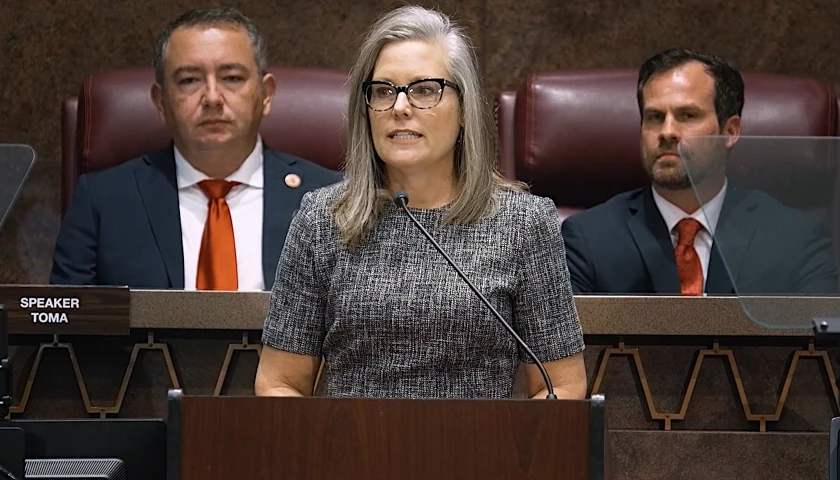by Adam Pack
Republicans are projected to maintain their majority in the House of Representatives, securing unified control of the federal government for the first two years of President-elect Donald Trump’s second term.
House Republicans, under Speaker of the House Mike Johnson’s leadership, will win at least 218 seats necessary for control of the chamber, Decision Desk HQ first projected Monday evening. CBS News projected GOP control of the House Wednesday, with Republicans netting at least 218 seats and Democrats holding 211. Six races have yet to be called, according to CBS News.
Decision Desk HQ projects that Republicans have won enough seats to control the US House.#DecisionMade: 7:13pm ET pic.twitter.com/5kHtX4vD27
— Decision Desk HQ (@DecisionDeskHQ) November 12, 2024
“I want to thank Mike Johnson,” Trump said in his victory speech at Mar-a-Lago early Wednesday morning on Nov. 6. “I think he’s doing a terrific job.”
 “America has given us an unprecedented and powerful mandate,” Trump added.
“America has given us an unprecedented and powerful mandate,” Trump added.
Democrats’ failure to retake the House is another blow to the Democratic Party’s electoral performance, which suffered a decisive beatdown by GOP candidates in battleground races across the country on election night. With Trump winning every battleground state and Republicans flipping four seats to retake Senate control, the GOP has secured a unified government control to push through Trump’s legislative priorities.
The GOP’s current trifecta may leave little wiggle room for disagreement — or infighting — among Republicans as they seek to pass legislation. The party’s unified control of government during the first two years of Trump’s first term notably had a higher majority in the House.
Trump’s decision to tap two House Republicans — Reps. Elise Stefanik of New York and Mike Waltz of Florida — to serve in his administration further complicates the conference’s slim margins.
“I know he’s already pulled a few really talented people out of the House, hopefully no more for a while until special elections can come,” Republican Louisiana Rep. Steve Scalise, House Majority leader, said during a press conference yesterday morning celebrating Republicans’ House control.
Republicans will almost certainly pursue a budget reconciliation package early next year to maintain or expand the tax cuts signed into law in December 2017 and claw back federal spending from the Biden-Harris administration that has not been obligated. Republican South Carolina Senator Lindsey Graham has called on Republicans to include border security language in a potential budget reconciliation bill.
If House Democrats are united in opposition, Johnson could afford to lose only a handful of votes to ensure a reconciliation package passes in the House.
Republican House incumbents in competitive races that managed to edge out their Democratic challengers include Reps. Mike Lawler of New York, Don Bacon of Nebraska and Ken Calvert of California.
Lawler, a freshman lawmaker, routed his Democratic opponent, former New York Rep. Mondaire Jones, by roughly seven percentage points in New York’s 17th District. Lawler also overcame a significant registered Democratic advantage and more than $20 million spent against his campaign.
Bacon managed to beat his Democratic opponent by roughly three percentage points despite Harris winning Nebraska’s Second District by a four point margin and being outraised by nearly $1 million. The four-term Republican incumbent was projected to lose, according to the Cook Political Report’s final projection of the race.
Calvert, chair of the House Defense Appropriations subcommittee, narrowly defeated his Democratic challenger Will Rollins in a rematch contest during which Rollins outraised the Republican incumbent by roughly $4 million.
Republicans upset two Democratic Pennsylvania incumbents in “toss-up” races. Reps. Susan Wild and Matt Cartwright lost to their Republican opponents, Ryan Mackenzie and Rob Bresnahan, by two percentage points or less.
The GOP flipped the seat previously held by Democratic Michigan Senator-elect Elissa Slotkin with former Michigan state Sen. Tom Barrett’s victory in the state’s Seventh District. Republican candidate Gabe Evans also sent freshman Democratic Colorado Rep. Yadira Caraveo packing in a GOP pick-up in Colorado’s Eighth District.
“There is no sugarcoating it: this is a bitterly disappointing outcome,” Wild, who was seeking her fourth term, said in a statement conceding the race on Nov. 6.
Despite former Speaker of the House Nancy Pelosi and her successor, House Minority Leader Hakeem Jeffries, both projecting confidence in a Democratic takeover, the Party flipped just six seats and lost three members, according to CBS’s current projection. Several House Democratic incumbents, such as New York Rep. Pat Ryan and Washington Rep. Marie Gluesenkamp-Perez, ran significantly ahead of Democratic presidential nominee Kamala Harris and will serve in the 119th Congress.
Some Democratic lawmakers are blaming the Harris-Walz campaign’s leftward drift on cultural issues for undermining Democratic candidates up and down the ballot.
– – –
Adam Pack is a reporter at Daily Caller News Foundation.








